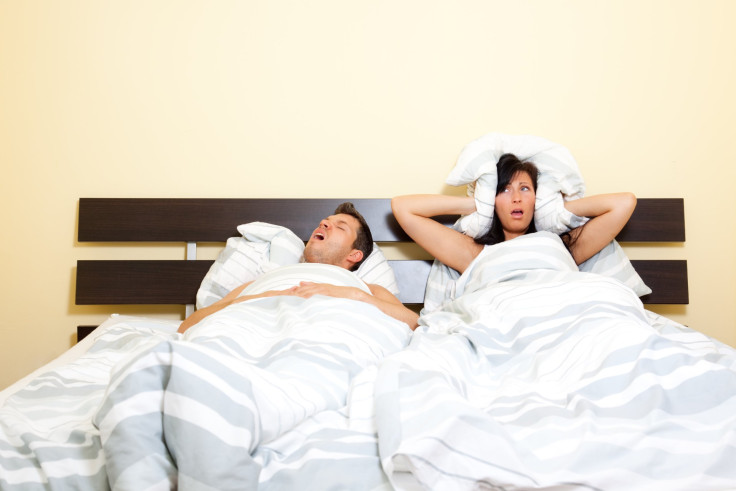Snoring Clues Us In To Sleep Problems; It's Also A Major Turn Off For Partners

More Americans are waking up with new sleep disorders every year, and one of them can even damage your sex life: snoring. According to a new survey from ORC International, an independent research firm from the American Academy of Dental Sleep Medicine (AADSM), 39 percent of adults agree snoring is a total turn off.
"Because it can be embarrassing, snoring can often be the elephant in the room when it comes to addressing relationship frustrations and health concerns," said Dr. Kathleen Bennett, president of the AADSM, in a press release. "But it's important that your significant other is made aware of their snoring — and the effects it has on you, your relationship, and their personal health — so they can begin taking steps to remedy it."
Researchers surveyed 1,009 randomly selected adults from across the nation, and 83 percent of participants reported having a snoring bed partner, but only 26 percent said it actually made them angry or annoyed. Snoring can be a sign of sleep apnea, one of the most common and detrimental sleep disorders today. When one of the participants reported hearing his or her bedmate snoring, 43 percent of them worried about the snorer’s health.
It’s a justified fear. Apneas can cause up to a 90 percent reduction of airflow, as soft tissue in the back of the throat collapses. It consequently blocks the airway and can last anywhere from a few seconds to a few minutes. The body struggles to push air through the closed airway until the person transitions from a deep sleep state to one that's lighter, allowing it to regain voluntary muscle control, reopening the airway.
This can happen as often as 50 to 100 times per hour, which leads to a continuous cycle of sleep and reawakening throughout the night. A person’s quality of sleep is significantly diminished due to snoring or sleep apnea, which is why treatment should be sought immediately after a bed partner recognizes the nightly pattern. Humans spend a third of their lives asleep, which should make sleep hygiene a priority to our health.
Obstructive sleep apnea is a more severe subtype of the condition that affects 20 million Americans. It’s typically caused by a decrease in muscle tone in the neck, a large tongue, or, in over 50 percent of cases, an excess of weight. Obesity is one of the biggest contributors to the sleep apnea population, and with over 78.6 million obese people in the country snoring rates will continue to climb.
Treating A Nation of Snorers
Sleep disorders have been recognized for their impact on health and quality of life. There has been an influx of patients to sleep centers and general medical practices with problems ranging form insomnia to sleep apnea. Over the past five years, the sleep-clinic industry has expanded at an annual rate of 13 percent, earning $5.8 billion in revenue in 2013, according to the market research firm IBIS World Inc.
People can snore without being diagnosed with sleep apnea. If that’s the case then count yourself lucky, but take advice from experts seriously when they recommend avoiding alcohol too close to bedtime or making sure your weight stays under control. The prevalence of sleep apnea in the overweight and obese populations should be enough of a warning for what’s to come if unhealthy weight gain continues.
“I’ve treated so many couples who claim that oral appliance therapy saved their marriage by giving the snorer more energy and better health, and allowing the partner to sleep better in bed with their sweetheart,” Bennett said.
Sleep apnea is either treated with a continuous positive airway pressure bedside machine or a mouth guard-like device used for so-called oral appliance therapy. Both options aren't really considered sexy, but they’re definitely an improvement from snoring your partner to the point of annoyance each night.
Source: Spousal Support Snories Survey Report. American Academy of Dental Sleep Medicine. 2015.
Published by Medicaldaily.com



























